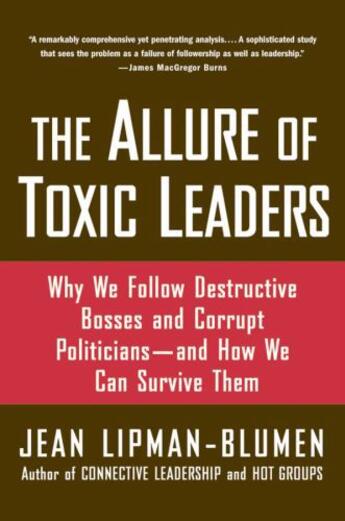Des idées de lecture pour ce début d'année !
Passionné(e) de lecture ? Inscrivez-vous
gratuitement ou connectez-vous pour rejoindre la
communauté et bénéficier de toutes les fonctionnalités du site !

Toxic leaders, both political, like Slobodan Milosevic, and corporate, like Enron's Ken Lay, have always been with us, and many books have been written to explain what makes them tick. Here leadership scholar Jean Lipman-Blumen explains what makes the followers tick, exploring why people will tolerate--and remain loyal to--leaders who are destructive to their organizations, their employees, or their nations.
Why do we knowingly follow, seldom unseat, frequently prefer, and sometimes even create toxic leaders? Lipman-Blumen argues that these leaders appeal to our deepest needs, playing on our anxieties and fears, on our yearnings for security, high self-esteem, and significance, and on our desire for noble enterprises and immortality. She also explores how followers inadvertently keep themselves in line by a set of insidious control myths that they internalize. For example, the belief that the leader must necessarily be in a position to "know more" than the followers often stills their objections. In addition, outside forces--such as economic depressions, political upheavals, or a crisis in a company--can increase our anxiety and our longing for charismatic leaders. Lipman-Blumen shows how followers can learn critical lessons for the future and survive in the meantime. She discusses how to confront, reform, undermine, blow the whistle on, or oust a toxic leader. And she suggests how we can diminish our need for strong leaders, identify "reluctant leaders" among competent followers, and even nurture the leader within ourselves.
Toxic leaders charm, manipulate, mistreat, weaken, and ultimately devastate their followers. The Allure of Toxic Leaders tells us how to recognize these leaders before it's too late.
Il n'y a pas encore de discussion sur ce livre
Soyez le premier à en lancer une !

Des idées de lecture pour ce début d'année !

Si certaines sont impressionnantes et effrayantes, d'autres sont drôles et rassurantes !

A gagner : la BD jeunesse adaptée du classique de Mary Shelley !

Caraïbes, 1492. "Ce sont ceux qui ont posé le pied sur ces terres qui ont amené la barbarie, la torture, la cruauté, la destruction des lieux, la mort..."